8 May 2014 | Belarus, News and features
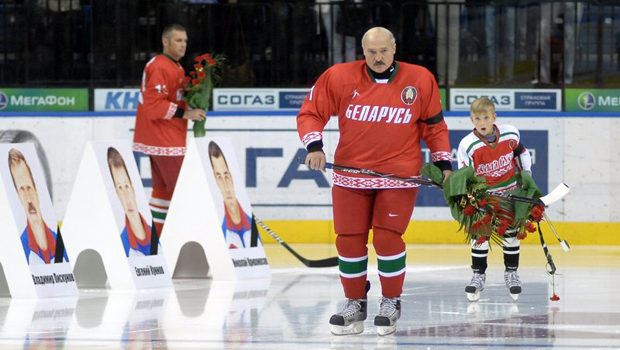
(Photo: Ivan Uralsky / Demotix)
Authorities in Belarus have been targeting human rights activists ahead of this weekend’s start of the International Ice Hockey Federation’s world championship in Minsk.
At least 17 political and civic activists were detained between 26 April and 6 May to prevent the organising of protests during the championship, which begins on 9 May. Another five are either in detention or being sought for questioning by police. All have been accused of minor hooliganism and sentenced to administrative detention of up to 25 days.
Such “preventive arrests” are common in Belarus. One of the activists, Pavel Vinahradau, who is known for his numerous detentions, opted to leave Minsk until the end of the championship. He had previously been summoned by the police: “They made it clear that either I go to Berezino (a small town 100 km outside Minsk) till 3 June, or I go to Akrestsina (a detention centre in Minsk). I choose Berezino,” Vinahradau wrote on Facebook.
A website called Totalitizator asks its visitors make predictions about which activists will be detained next, for how many days and on what charges. For people who follow political news in Belarus it is not difficult to make a choice.
Potential foreign “troublemakers” are also being kept away from the tournament. On Wednesday, Martin Uggla, a human rights activist from Sweden, was denied entry to Belarus when he was detained at Minsk-2 National Airport. According to temporary visa-free travel requirements, hockey supporters with valid game tickets do not require visa. Despite the fact Martin had one, border guards told him he was being prohibited from entering the country.
Belarus’ president Alexander Lukashenko is known for his love for hockey – and his unfulfilled desire of a real international profile. Consistent tensions with the Western democracies and an unwillingness to ease his authoritarian grip has deprived Lukashenko’s international relations of impact. Fifty-six of the president’s last 100 international visits were to Russia and Kazakhstan, though he has travelled to Turkmenistan, Venezuela, China and Cuba, as well.
The ice hockey championship in Minsk is set to become Lukashenko’s marquee performance on the world stage. That is why the government is rounding up activist voices. Lukashenko wants to present a calm, hospitable and prosperous country led by a wise and caring leader. The picturesque façade cannot hide the problems afflicting Belarus: An unsustainable economy hooked on huge Russian subsidies and a dismal human rights record.
Belarus remains the only country in Europe that still imposes the death penalty. On 18 April, 23-year-old Pavel Sialiun was, according to reports, executed. Sialiun’s case is still under review by the UN Human Rights Committee.
Nine political prisoners are still in jail in Belarus, including well-known human rights defender Ales Bialiatski, and former presidential candidate Mikalay Statkevich. A recent report by FIDH says they are in a critical situation. Many dissidents suffer regular restrictions to “their means of support, quality of food and medical assistance”, including being deprived of meetings with relatives and subject to limits on correspondence.
“Politically motivated persecution of civil society representatives and of the opposition is a general trend, and the limitations on political and civil rights of Belarusian citizens are pervading, both in national legislation and in practice,” says another statement by 12 human rights groups that represent the ice hockey championship participating countries.
But people who raise these issues are not welcome in Minsk these days. Even foreign journalists who are accredited for the championship are obliged to receive a separate accreditation at the Belarusian Foreign Ministry if they wish to cover issues other than hockey while in Belarus.
But many in the country fear the real issues to cover will appear after the championship is over on 25 May.
“Putin invaded the Crimea four days after the Sochi Olympics. Let’s see if Lukashenko will be that quick with another clampdown on civil society. But I am sure he will settle all accounts with us after the championship,” a leader of one Belarusian NGOs told Index in Minsk last week.
Next year, the country will vote in the presidential election. So there is more ice to come in Belarus after international hockey is gone.
An earlier version of this article specifically stated that both Ales Bialiatski and Mikalay Statkevich have been deprived of meetings with relatives and subject to limits on correspondence. While this may have been true in the past, we have not been able to confirm that this is currently happening to the pair.
This article was posted on May 8, 2014 at indexoncensorship.org
8 May 2014 | Azerbaijan, Azerbaijan News, Europe and Central Asia, News and features
This week eight young Azerbaijani activists were sentenced to between six and eight years in jail. The members of the N!DA Youth Movement, which works for democracy and social change, were convicted for possession of drugs and explosives, and for intending to “cause public disorder”. The charges are widely believed to be trumped up, and the trials have been criticised by foreign observers over “irregularities” and “shortcomings”, including inconsistencies in testimonies and mishandling of evidence.
This is just the latest addition to a long list of human rights abuses by authorities in the oil rich country. As the repression has largely been allowed to take place away from international attention, this is a good moment to remember a few things about Azerbaijan, especially as the country prepares to take over a six month chairmanship of the Council of Europe’s Committee of Ministers.
1) The six are far from the only political prisoners in Azerbaijan
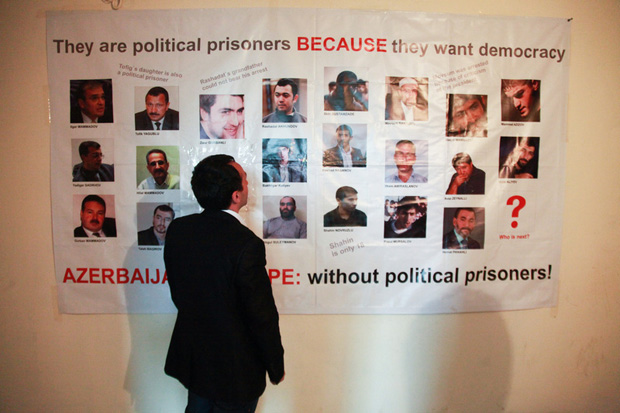
(Image: Aziz Karimov)
According to the latest figures, there are 142 political prisoners in Azerbaijan today. These include human rights defenders, youth activists, and a large number of religious activists, among others. There are currently 17 people serving life sentences. Ahead of the country’s presidential election last October, candidate Ilgar Mammadov was arrested. In March, he was sentenced to seven years in prison for “organizing mass disturbances” and “resisting the police”. Meanwhile, President Ilham Aliyev insists that there are no political prisoners in Azerbaijan.
2) You may escape imprisonment, but you could still face violence and intimidation
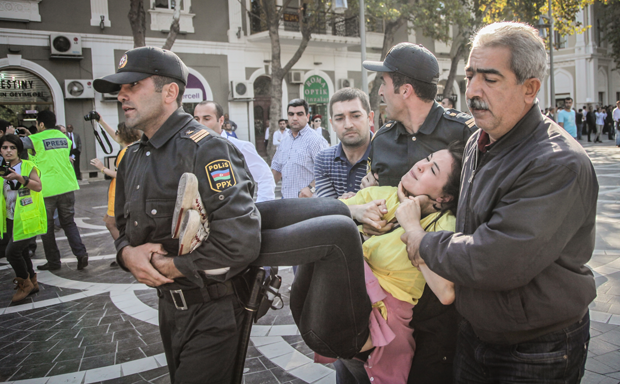
(Image: Aziz Karimov)
Attacks, threats and intimidation are regular occurrences for political opponents, activists and press in Azerbaijan. Following protests in the capital Baku as Aliyev secured his third consecutive term in power last October, demonstrators were beaten and detained by police. Police also raided the offices of independent Election Monitoring and Democracy Studies Centre (EMDSC) which reported irregularities in the election. In 2012, reporter Idrak Abbasov was brutally beaten when filming the demolition of a house by the State Oil Company of Azerbaijan, allegedly by employees of the company and police. The same year, fellow journalist Khadija Ismayilova, known for covering corruption among the country’s powerful elite, was blackmailed with intimate images of her and her boyfriend. She continues to face intimidation today. These abuses are often allowed to happen with impunity.
3) Independent and critical media are under threat

(Image: Alex Brenner for Index on Censorship)
Azerbaijan’s critical press have long been subjected to an array of attacks. Independent news outlets face economic sanctions, and are often barred from distribution networks. Some 70% of distribution is controlled by the government. Most of the nine national TV channels are either directly owned by the state or controlled by the authorities. Journalists also fall victim to legal threats. In the first six months of 2013, 36 defamation suits were brought against media outlets or journalists, four of which were criminal defamation suits. One victim of this hugely restrictive media environment is leading independent paper and Index Award winner Azadliq. The paper has been hit with £52,000 worth of fines following defamation suits, state-owned press distribution company Gasid has not been transferring payments that reflect the paper’s sales. Azadliq claims Gasid owe them some £44,000.
4) Authorities are on an ongoing PR mission

(Image: Zeljko Joksimovic/Wikimedia Commons)
While the situation inside the country shifts between bad and worse, authorities have focused their attentions on a wide-reaching international PR campaign. Ahead of hosting the Eurovision Song Contest, authorities ordered urban renewal that saw houses demolished and families evicted. Vast sums have in recent years been poured into the radical regeneration and beautification of Baku, and there’s more to come. There is also the posh London bar Baku, owned by the Aliyevs; the glossy, internationally distributed Baku magazine, edited by first daughter Leyla and co-published by Conde Nast; and the sponsorship deal with Champions League finalists Atlético Madrid. Next year, Baku will again play host to a prestigious international event — the inaugural European Games.
5) They are about to take charge of one of Europe’s most important human rights bodies
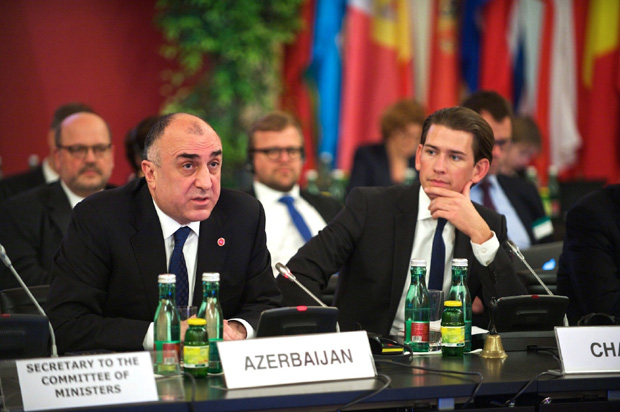
(Image: Sandro Weltin/Council of Europe)
“The Committee of Ministers supervises the execution of judgments of the European Court of Human Rights the Council of Europe…The Committee of Ministers’ essential function is to ensure that member states comply with the judgments and certain decisions of the European Court of Human Rights,” the Council of Europe declare on their website. Next week Azerbaijan will assume the chairmanship of this very Committee of Ministers. But one could say that COE is only sticking to form in its relationship with the country. Only last year, a majority in its Parliamentary Assembly (PACE) voted down a resolution on the existence of political prisoners in Azerbaijan.
This article was originally published on 8 May 2014 at indexoncensorship.org
7 May 2014 | Asia and Pacific, China, News and features
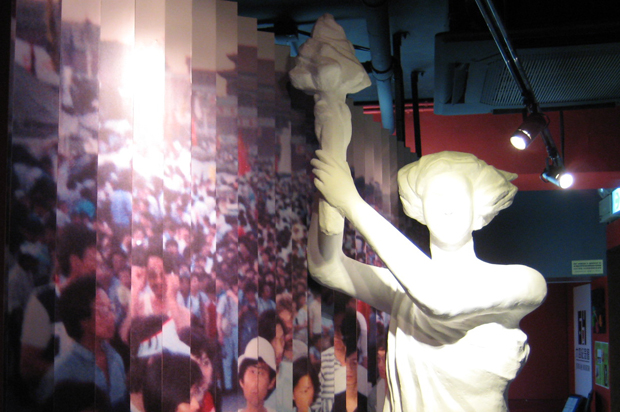
(Photo: Hannah Leung)
The world’s first museum dedicated to the 1989 pro-democracy protests in Beijing’s Tiananmen Square opened in Hong Kong last Saturday to mark the 25 year anniversary. Named the June 4 Memorial Museum, it hopes to educate the millions of mainland tourists who visit Hong Kong each year.
The violent suppression of student protests in Tiananmen Square remains a taboo topic in mainland China, banned from official discourse. Beijing considers the weeks of peaceful protest by students and workers a “counter-revolutionary” revolt and defends its decision to send in the army. To this day no official numbers of the death toll have been released and many young Chinese in particular are unaware of its occurrence.
Index visited the museum a few days after its launch. Located in the busy district of Tsim Sha Tsui, the bustling side streets of Hong Kong’s main Korean centre, the museum sits on the fifth floor of a commercial building. Inconspicuously sandwiched in the throngs of bars and Korean fried chicken joints, discretion is key. It’s easy to walk past the museum if you don’t know what you are looking for and signs of its existence are only given at the floor directory located by the elevator.
A curator at the museum tells Index that since its opening the museum has received around 300 visitors per day, with an even split between mainlanders and Hong Kong residents. At the time of our visit, there were mostly Hong Kong residents in attendance, with a sprinkling of mainland visitors. It’s also packed. Despite being a normal weekday and an hour before closing time, a queue weaves out the door. The sense of eagerness to discover something is palpable amongst the patrons.
The space is modest – 800 square feet in total – with both people and information meticulously squeezed in. School children browse through books and pamphlets found on a bookshelf. Some pose for pictures with a Goddess of Democracy statue located by the entrance. The statue is a replica of one created by the protesters in the days before the crackdown.
Copies of newspaper clippings, photos, videos and an interactive feature on the configuration of the protestors at Tiananmen Square, which went on for a month, are all on display. The centrepiece is a video of the Tiananmen Mothers, a group of activists personally affected by the protests, some of whom lost children or relatives in the crackdown. Testimonies given in the clips go through the agony of losing a university-aged child, and the subsequent upset of being forced to lie about the way their children died. They have been forbidden by the government, then and now, to reveal the truth.
One young woman, a tourist from mainland China, is visibly in tears as she watches the documentary. Others are less moved and some attendees have criticised the museum for not being sombre enough. A couple, also from the mainland, fiddle with the interactive feature found in the centre of the museum before the man, seemingly bored, says he wants to leave.
That visitors are here however, is a feat in and of itself. While free speech is protected in Hong Kong in theory under the One Country Two Systems agreement, closer ties to the Chinese mainland in recent years have led to incursions on free speech, as Index recently reported. In the weeks leading up to the museum’s unveiling many were sceptical about whether it would open at all. Occupants of the same building called for its closure, citing safety concerns. The museum’s backers believe Communist Party officials were behind these efforts. In another incident, Yang Jianli, a US-based activist who participated in the protests in 1989, was refused entry to Hong Kong to attend the opening ceremony. The launch was greeted by more protests from pro-China demonstrators.
Over in a small area by the exit, memorabilia is sold. USB memory drives are also available upon enquiry containing information and images related to the killings. Museum founders hope visitors will smuggle these over the border into mainland China, and in so doing force the Communist government to admit its crimes. They might be an overly optimistic aim, but at least the June 4 museum is confronting China’s recent past in an honest, open way.
This article was published on May 7, 2014 at indexoncensorship.org
7 May 2014 | Digital Freedom, News and features, Politics and Society, United States

(Photo: Shutterstock)
The reforms to the intelligence community that have been advocated by US President Barack Obama are not being taken well in some circles. This is not necessarily because all members of that covert fraternity object to them. There has been, in fact, a general understanding that something had to be done in light of Edward Snowden’s revelations regarding dragnet surveillance. A fundamental feature of Obama’s reform agenda centres on a greater oversight role regarding surveillance applications assessed by the Foreign Intelligence Surveillance Court (FISC).
Former FISC Presiding Judge John Bates has given, in a fashion, support for proposals that would allow the appointment of a public advocate or lawyers acting in an amicus curiae role. Their role suggests, in spirit at least, a modest attempt to open an otherwise secret court process to scrutiny over surveillance applications, providing direction on privacy and specific legal points. “I think it could have some good elements if done correctly,” suggested the judge before a gathering at George Washington University Law School last Friday.
Reading between the lines, however, the judge is not glowing at the prospect of an increased work load, one affected without little benefit. For one, he claims that an outside advocate is, for the most part, needless in standard court deliberations (pen registers, trap-and-trace orders and individualised search warrants) under the Foreign Intelligence Surveillance Act of 1978. Furthermore, surveillance applications tended to be prosaic matters with specific individuals in mind, using such standards as probable cause that would only affect the privacy interests of an individual or set of individuals. Amicus advocates would busy the court without any benefit, they being, for the most part, unqualified to deal with the technical matters at hand.
Where such a “friend” of the court might have some bearing would be on concerns over bulk-collection of data, though the judge was again shaving much relevance over the move. Was this reform a genuine attempt to alter practice, or simply one designed to pacify “public perception”? Those on the FISC are more troubled than pleased.
Many of the concerns made by Judge Bates were outlined in his January 13 letter to Senator Dianne Feinstein, Chair of the Select Committee on Intelligence. It is worth reading carefully, given the role Bates has played as chief judicial officer over FISC matters. A vigorous, conceptual tussle between secret deliberations and transparency is undertaken, much of it fundamental over the role of the court in “oversight” matters.
If workloads were to increase, then this should be “accompanied by a commensurate increase in resources.” Adding a number of administrative subpoena-type cases in excess of 20,000 “would fundamentally transform the nature of the FISC to the detriment of its current responsibilities.” But even such an increase of work would not necessarily be remedied by the mere addition of personnel and resources. It would “prove disruptive to the Courts’ ability to perform their duties, including responsibilities under FISA and the Constitution to ensure that the privacy interests of United States citizens and others are adequately protected.”
Like it or not, Judge Bates suggests that the secrecy function of the FISC should continue. In this, the judge slips into his paternalistic voice, suggesting that publishing Court decisions for public consumption would limit rather than “enhance the public’s understanding of FISA implementation”. Unless classified information is provided with those decisions, confusion was bound to happen.
A real bruiser comes in his detailed observations over what role the public advocate would actually play in FISA proceedings. First and foremost, there will be no constructive adversarial role to speak of, as the advocate will be “unable to communicate with the target or conduct an independent investigation”. Privacy protection will not be assured by involvement of the advocate in “run-of-the-mill FISA matters” and might “undermine the Courts’ ability to receive complete and accurate information on the matters before them.”
Much of the concern stems from who has the authority over appointments. A court appointed advocate might well be more palatable for judges, but it will hardly satisfy the privacy reformists, who wish to open the FISC door to some form of public accountability. But according to Judge Bates, a “standing advocate with independent authority to intervene at will could actually be counterproductive” while a court appointee may well maximise assistance while minimising disruption. He also fears the “constitutional” implications of the move.
Some of Bates’ concerns on the public advocate may be uncalled for. They are already considered in the Leahy/Sensenbrenner and Blumenthal bills. Both make the point that the special advocate only appear in set cases, and never in those touching on individualised search warrants. They would only deal with novel matters affecting subjects of surveillance targeting persons outside the United States (FISA, s. 702) and American subjects under s. 215 of the USA PATRIOT Act.
Judge Bates’ overview suggests that some reforms to the hearing and granting of surveillance applications are not only modest but cosmetic, in so far as they hope to improve privacy protections. The impact will be to actually hamper judicial oversight, rather than improve it. The adversarial element that would improve representation would actually be absent, despite the presence of the public advocate, making the reform one of bluff rather than effect. No change, however, would have been intolerable.
Speaking to a gathering of national security lawyers organised by the American Bar Association, Judge Bates had a prediction. “My guess is nothing will happen legislatively until after the mid-term elections – if then.” There will be congressional disagreements about matters of form and substance. If care is not taken, enacted reforms may well be the bunting without the product.
This article was published on April 7, 2014 at indexoncensorship.org








